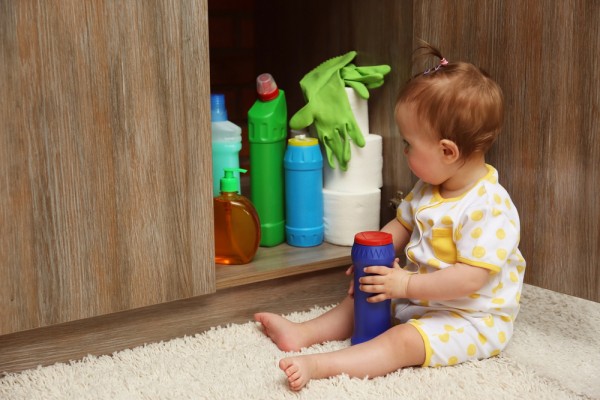Poison Prevention
May 5, 2020


With the recent changes due to COVID-19, children are out of school and daycare. Many children are being cared for by parents that are simultaneously attempting to work from home. Distraction for even a moment can be disastrous in many ways, one of which is ingestion and/or contact with a poisonous substance. Most poisonings occur when parents or caregivers are home but not paying attention.
The most dangerous potential poisons are medicines, cleaning products, liquid nicotine, antifreeze, windshield wiper fluid, pesticides, furniture polish, gasoline, kerosene and lamp oil. Be especially vigilant when there is a change in routine as these bring greater risks of poisoning when the normal safeguards are not in place.
Think of your ibuprofen tablet, it is red or orange, round, possibly shiny… To a child, it looks a lot like candy. The same thing goes for cleaning products that have bright colors and sweet smells. They may appear and smell like apple juice or fruit punch. Children’s natural instinct is to have a taste.
Protect your child from poisoning by following these easy tips from the American Academy of Pediatrics:
- Store all medicine (including vitamins), cleaning/laundry products, paints/varnishes, and pesticides in original packaging in locked cabinets/containers out of sight and reach of children.
- Automatically locking safety latches on cabinet doors can help keep children away from dangerous products, but there is a chance the device will malfunction or the child will figure out how to open it. The safest place to store poisonous products is somewhere the child cannot reach or see.
- Keep all medicines in containers with safety caps and keep out of reach of children. Discard all unused medication. Remember that safety caps are designed to be child resistant but are not fully child proof.
- Never refer to medicine as “candy” or another appealing name.
- Check the label each time you give a child medicine to ensure proper dosage. For liquid medicines, use the dosing device that came with the medicine. Never use a kitchen spoon.
- If you use an e-cigarette, keep the liquid nicotine refills locked up out of children’s reach and only buy refills that use child resistant packaging. Ingestion or skin exposure with just a small amount of the e-cigarette liquid can be fatal to a child.
- Never place poisonous products in food or drink containers.
- Keep natural-gas-powered appliances, furnaces, and coal, wood or kerosene stoves in safe working order.
- Maintain working smoke and carbon monoxide detectors.
- Secure remote controls, key fobs, greeting cards, and musical children’s books. These, and other devices, may contain small button-cell batteries that can cause injury if ingested.
- Know the names of all plants in your yard. If you have young children or pets, consider removing those that are poisonous.
- Avoid taking your medications in front of your child, as it is a natural instinct for a child to imitate
What to do in case of poisoning?
-If your child is not breathing, collapses, has a seizure, has trouble breathing, or can’t be awakened, call 911 immediately.
-If your child shows mild signs of poisoning or you suspect poisoning, call poison control at 1-800-222-1222
-Even if you think a substance may not do harm, be cautious and call poison control to be sure!
While calling 911 or poison control follow the “Act Fast” actions:
–Poison inhaled: Take the child out for fresh air immediately
–Poison on the skin: Remove clothing and rinse skin with room temperature running water for 15 minutes
–Poison in eyes: Rinse eyes with room temperature running water for 15 minutes
*Remember: Never induce vomiting in a child that has swallowed a poison.
For more information on potential dangers and how to respond, visit www.poison.org
https://www.poison.org/actfasthttps://shine365.marshfieldclinic.org/kids-health/poison-prevention/